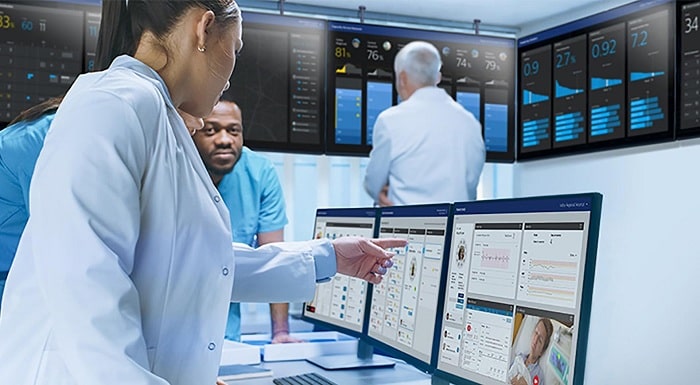Philips is an active participant in the new European Union (EU) European Federation for Cancer Images consortium (EUCAIM) – a cornerstone project in the European Cancer Imaging Initiative that was launched by the European Commission in the run-up to World Cancer Day 2023. Addressing the need for researchers and innovators to access real-world oncology data at the scale and quality needed to develop new solutions to help detect, diagnose and treat cancer, notably those based on artificial intelligence (AI), the European Cancer Imaging Initiative will work towards creating a digital infrastructure that links up resources and databases of cancer imaging data across the EU, while ensuring adherence to high standards of ethics, trust, security, and data protection.
Within the Cancer Imaging Initiative, the EUCAIM project will focus on designing and deploying a federated infrastructure for cancer imaging data, with the resultant atlas of cancer imaging repositories made available to the initiative‘s second cornerstone project – the AI Testing and Experimentation Facility for Health (TEF-Health). TEF-Health will allow subject matter experts and other partners to test AI-based cancer care solutions using real-life data. The proposed infrastructure will also provide a platform for individual European citizens to donate their data for the purposes of cancer research.
“The Cancer Imaging Initiative will provide vital information for the next generation of cancer diagnostics and treatment and help us make screening more precise, timely and accessible. It is a key example of how we invest and make the best use of the potential of innovative digital solutions under Europe’s Beating Cancer Plan to change the realities for cancer patients and their families,” said Stella Kyriakides, European Commissioner for Health and Food Safety at the Cancer Imaging Initiative launch event in Brussels.
“Philips warmly welcomes this initiative as it offers access to health data in oncology and an excellent opportunity to engage with and collaborate with this community. This will help to develop AI-powered solutions derived from these data and validate them with clinical partners and customers such as La Fe Hospital in Valencia and Charité in Berlin. This initiative has immediate application in cancer AI-innovations, as these innovations rely on longitudinal patient data as well as a broad cohort to ensure robust AI solutions that be adopted into clinical practice,” said Tina Manoharan, Vice President of Data, AI and Digital Innovation at Philips.
Addressing the needs of expanded screening
One of the key aims of Europe’s Beating Cancer Plan is to ensure that 90% of the EU population who qualify for breast, cervical, or colorectal cancer screening are offered it by 2025, resulting in increased imaging volumes for screening and the precision diagnosis and personalized treatment of detected cases. AI is widely regarded as a powerful tool that could help radiologists cope with the workload. By combining AI with deep clinical knowledge, Philips is already creating AI-enabled solutions that integrate into and accelerate clinical workflows and provide clinicians with greater clarity at every moment of cancer care. Philips MRCAT (MR for Calculating Attenuation) Brain imaging software, for example, uses trained AI models to capture information needed to accurately and efficiently generate a patient’s radiotherapy plan in a single fast MR exam, without the need for a time and resource consuming CT scan and subsequent CT-MR image co-registration. In an ongoing partnership with Leiden University Medical Center (Leiden, The Netherlands) that recently benefited from EUR 2 million funding from the Dutch Research Council (NWO), Philips is developing innovative new AI solutions to further speed up and improve MR examinations, the aim being to reduce scan times from tens of minutes to less than five minutes and reconstructing detailed MR images despite patient or internal organ movement.
By automating and accelerating routine imaging tasks, Philips’ AI-based solutions aim to simplify workflows and logistics, leaving more time for clinicians to focus on their patients’ needs. At the same time, AI-enabled image reconstruction, quantitative analysis, and data integration tools allow oncologists to make better-informed decisions in diagnosis, therapy planning, treatment, and follow-up to provide patients with more precise and personalized cancer care.
Philips AI-enabled cancer care solutions
Philips intelligent Advanced Visualization and Pathway informatics solutions integrate data across radiology, pathology, genomics, and EHR systems to provide a comprehensive multi-faceted view of each individual patient’s unique cancer status, with plug-ins such as Multimodality Tumor Tracking, CT Spectral Tumor Tracking, and CT Virtual Colonoscopy to help aid decision-making. On top of that, the solution provides an additional layer of information access and management, including Dana-Farber Cancer Institute’s clinical pathways, genome informatics, clinical reporting, and clinical trial matching.


















